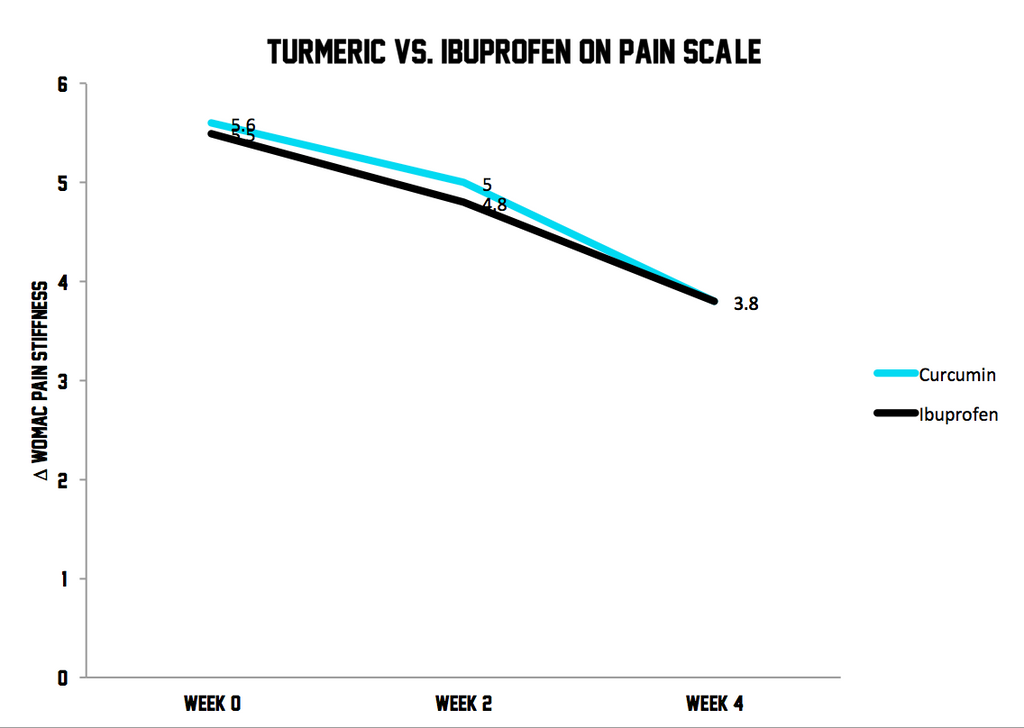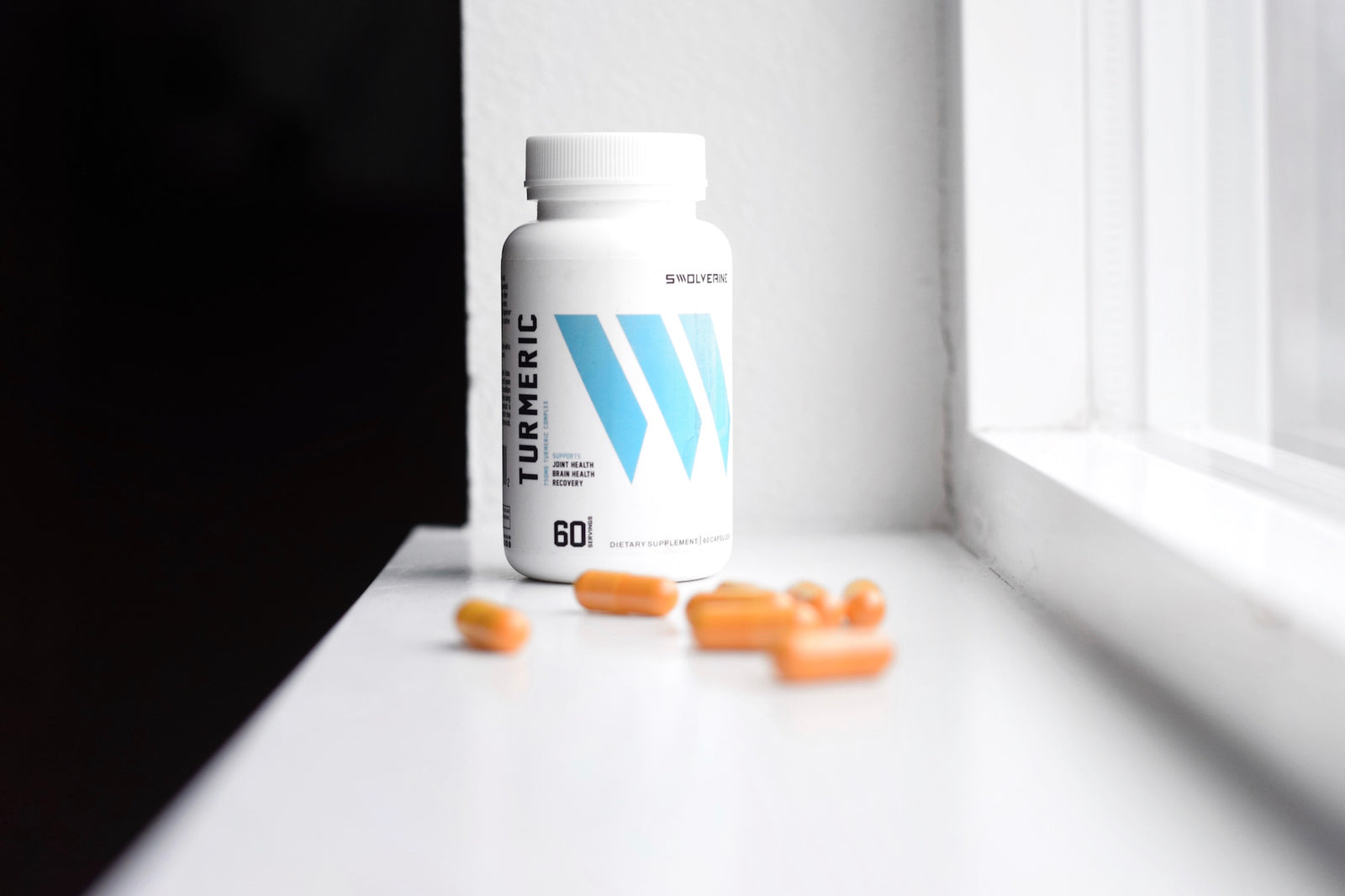Recovery is key to minimize injury and maximize performance. One of the best supplements for reducing minor aches and pains post-workout is Turmeric. Turmeric has been used as an Ayurvedic medicine for over 4,000 years, making it one of the oldest known herbal remedies for holistic medicine in human history. Recent studies have shown that Turmeric, specifically it’s active component curcumin has a powerful anti-inflammatory effect and can help reduce post-workout inflammation and promote joint health and joint mobility.
In this article, you will learn
- What Is Turmeric?
- Turmeric’s Unique Molecular Makeup
- The Health Benefits Of Turmeric
- Turmeric Vs. Ibuprofen
- How Much Turmeric You Should Take?
- What's The Best Turmeric Supplement?
- Should You Take Turmeric For Recovery?
What Is Turmeric?
Turmeric is a rhizomatous herbaceous perennial plant (Curcuma longa). Sometimes referred to as Indian Saffron or the golden spice, Turmeric is part of the Ginger family and is a tall plant that grows in Southeast Asia and cultivated in India. The turmeric that you find in supplements is directly derived from the plants roots. Through several studies, Turmeric been proven to provide countless health benefits from improving joint health and mobility, reducing exercise-induced inflammation and muscle soreness, thus enhancing recovery and performance. But, that’s not all.
Turmeric’s Unique Molecular Makeup
Turmeric contains over 100 unique chemical properties that contribute to its countless therapeutic and anti-inflammatory effects. The most active ingredient in Turmeric is Curcumin a polyphenol that has been shown to target multiple signaling molecules at the cellular level. Curcumin is responsible for giving the turmeric root its beautiful yellow-orange color. Curcuminoids, the group of chemical compounds accountable for the health benefits of turmeric, include curcumin, demethoxycurcumin, and bisdemethoxycurcumin. Turmeric also contains volatile oils, including tumerone, artumerone, and zingiberene. Curcumin has been shown to have multiple health benefits, including inflammatory conditions, metabolic syndrome, and degenerative eye conditions.

Despite the health benefits associated with Curcumin, the major problem with ingesting curcumin by itself is its poor bioavailability. Adding a digestive bioavailability enhancer such as Bioperine, the major active component of black pepper can increase the bioavailability of curcumin by 2000%.
If you’re looking for a good turmeric supplement, make sure it’s 95% Curcuma longa, and that it contains piperine or BioPerine for optimal absorption. At Swolverine we add 5mg of BioPerine, to our Turmeric supplement or optimal absorption and bioavailability. Find out more about our Turmeric product below.
RELATED ARTICLE The Benefits Of BioPerine
RECOMMENDED PRODUCT Turmeric (750mg)
The Health Benefits Of Turmeric
Turmeric is currently one of the buzziest words in the food and supplement space, due to it’s many proclaimed health benefits, including
- Cancer Prevention
- Antioxidant Capabilities
- Improved Brain Function
- Lowering your risk of heart disease
- Treating Alzheimer's Disease
- Treating Arthritis
- Anti-Inflammatory Effects
- Improved Mobility
- Reduction of Joint Pain
Numerous clinical trials, are currently in progress over the next several years, to provide a deeper understanding of the therapeutic potential and benefits of turmeric. However, in this article, we are focusing on the benefits that are currently supported through clinical research.
Turmeric is a remarkable supplement for athletes, as it can help reduce post-workout aches and pains, as well as improve joint mobility through its anti-inflammatory effects.
Turmeric Has Anti-Inflammatory Effects
One of the main benefits of Turmeric, primarily curcumin is found in its ability to act as an anti-inflammatory agent and reducing inflammation. Research has shown that curcumin is a highly active molecule that modulates the inflammatory response by inhibiting the production of inflammatory cytokines. This is especially beneficial to those athletes that participate in high impact or high-intensity functional training.
It is well understood that pro-inflammatory states or chronic inflammation can lead to disease and illness, such as cancer, heart disease, and gastrointestinal conditions such as ulcerative colitis [R]. By proactively supplementing Turmeric, you can help reduce chronic inflammation, thus prophylactically protecting yourself from chronic illness and disease.
Turmeric Benefits Joint Health And Mobility
In addition to chronic inflammation, several studies have been initiated to define Turmeric’s unique role and mechanism of action on arthritic pain, specifically joint inflammation and mobility by reducing joint swelling. In vivo animal studies, have shown that curcuminoids contribute to anti-arthritic effects, helping to reduce joint swelling and inflammation, up to 48% [R ,R]
This can be especially beneficial for athletes and active individuals to help reduce exercise-induced inflammation and promote faster recovery. Often times, joints can produce inflammation from stress-related movements and can result in pain and discomfort, and result in further stress-related injury.
While many people opt to treat post-workout inflammation with prescribed, or over-the-counter anti-inflammatory medications such as Ibuprofen, those treatment options can pose serious health risks. Turmeric can provide an all natural, safe, and effective treatment option, free of synthetic chemical constituents, and side effects to help treat joint inflammation and health.
Turmeric Improves Memory Recall And Mood
According to a new study conducted by The University of California – Los Angeles (UCLA), curcumin was proven to help improve memory and mood in people with mild, age-related memory loss.
In a double-blind, placebo-controlled study 40 adults between the ages of 50 and 90 years who had mild memory complaints, were randomly assigned a placebo or 90 milligrams of curcumin twice daily for 18 months. The curcumin group experienced significant improvements in their memory and attention abilities, while the placebo group did not. In memory tests, the people taking curcumin improved by 28 percent over the 18 months [R].
Therefore, with preliminary interim results, there will be a basis and justification for a randomized control trial, with a larger enrollment, to in fact determine these findings, and confirm their results.
Turmeric Vs. Ibuprofen
Ibuprofen is commonly taken to decrease exercise-induced pain and inflammation associated with injury. However studies conducted over the last 10 years, have contributed to a growing amount of evidence supporting the notion, that ibuprofen taken after a workout may be causing more harm than good, specifically to the GI tract in terms of damage and the musculoskeletal system in regard to muscle recovery, growth, and inflammation.
RELATED ARTICLE Should You Take Ibuprofen After Your Workout?
Many people take Ibuprofen after a strenuous workout, as a safeguard against post-workout inflammation and muscle soreness.
In a randomized controlled study on knee osteoarthritis published in the Journal Of Evidence-Based Complementary and Alternative Medicine 367 collective patients were administered 1,500mg of turmeric or 1,200mg of Ibuprofen per day for four weeks. The results indicated that 1,500 mg of turmeric supplement consumption daily was shown to have anti-inflammatory and analgesic properties comparable to 1,200 mg of ibuprofen [R, R]

How Much Turmeric Should You Take?
If you’re taking Turmeric for its anti-inflammatory effects, then you need at least 500-1,000 milligrams of curcuminoids per day.
When using Turmeric spice on its own, the common rule of thumb is that there are 200 milligrams of curcumin in one teaspoon of fresh ground turmeric. The problem, however, is with your body’s ability to absorb it. Therefore, if you want all of the associated health benefits and anti-inflammatory superpowers that lie within curcumin, then you’ll need to take a supplement that pairs turmeric with black pepper (piperine, Bioperine)

Swolverine’s Turmeric supplement contains 750 milligrams of Turmeric with 95% coming directly from Curcuminoids, paired with 5 millligrams of BioPerine for optimal absorption, so you get the nutrients you need to power your active lifestyle.
Should I Take Turmeric?
While many people opt to treat inflammation with prescribed, or over-the-counter anti-inflammatory medications, such as Ibuprofen and NSAID pain relievers, these treatment options can pose serious health risks. If you’re looking for a natural way to reduce joint inflammation and improve joint mobility, then Turmeric would be a great option to help you recover faster, reduce inflammation, and improve brain health and mood.
Looking for an amazing Turmeric Supplement to help you reduce inflammation?
SWOLVERINE IS AN ENDURANCE ATHLETE AND ACTIVE LIFESTYLE BRAND. MADE FOR THE ELITE ATHLETE, AND THE STRONG-WILLED OUR PRODUCTS WERE DESIGNED TO FUEL YOUR ATHLETIC PERFORMANCE. WE PERFORM WHEN YOU PERFORM.
We believe that everyone can optimize not only their athletic performance but their human potential. The way we believe we can optimize performance is through transparency, clinically effective doses, and clinically proven ingredients with evidence-based outcomes. We provide the nutrients you need to power your active lifestyle.
References
Hewlings, Susan J and Douglas S Kalman. “Curcumin: A Review of Its' Effects on Human Health” Foods (Basel, Switzerland) vol. 6,10 92. 22 Oct. 2017, doi:10.3390/foods6100092
Jurenka JS. Anti-inflammatory properties of curcumin, a major constituent of Curcuma longa: a review of preclinical and clinical research. Altern Med Rev. 2009;14(2):141-53.
Funk JL, Oyarzo JN, Frye JB, et al. Turmeric extracts containing curcuminoids prevent experimental rheumatoid arthritis. J Nat Prod. 2006;69(3):351-5.
Perkins, Kimberly et al. “Efficacy of Curcuma for Treatment of Osteoarthritis”Journal of evidence-based complementary & alternative medicine vol. 22,1 (2016): 156-165.
Kuptniratsaikul V, Dajpratham P, Taechaarpornkul W, et al. Efficacy and safety of Curcuma domestica extracts compared with ibuprofen in patients with knee osteoarthritis: a multicenter study. Clin Interv Aging. 2014;9:451-8.
Daily, James W et al. “Efficacy of Turmeric Extracts and Curcumin for Alleviating the Symptoms of Joint Arthritis: A Systematic Review and Meta-Analysis of Randomized Clinical Trials” Journal of medicinal food vol. 19,8 (2016): 717-29.














